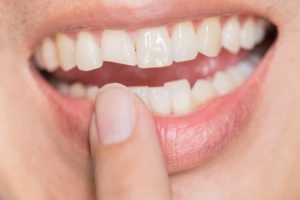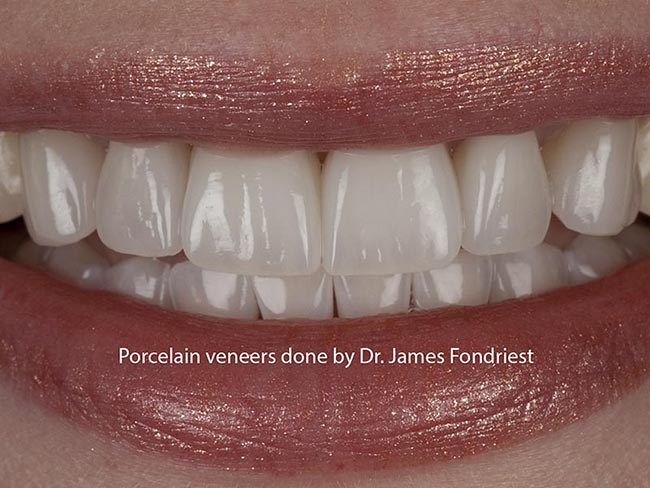
Do you have a chipped tooth? The chipping or cracking of a tooth can cause a permanent change to the way you look when you smile. Dental injuries can be so frustrating because teeth fail to heal from harm, and because that harm can have such a big impact on your overall appearance. A skilled cosmetic dentist can provide a natural looking treatment that leaves your chipped or cracked tooth in great shape. The type of care recommended can vary based on how badly damaged your tooth is. In situations where a chip or break hurts with bite pressure on the remaining tooth, veneers or bonding may be ideal options.
Common Causes of a Chipped Tooth
There are several reasons why a tooth may become chipped or cracked. For example:
- Dental trauma, sustained by falls, auto accidents, or sporting injuries can lead to chips, cracks, or fractures.
- Bruxism – or, chronic teeth grinding – can place excessive pressure on the teeth, causing them to crack.
- Old fillings that are too large can sometime weaken the integrity of a tooth. As a result, the structure becomes damaged over time.
- Extremely hard foods such as ice, hard candy, popcorn, and nuts can cause the teeth to chip.
- Sudden temperature changes can cause a tooth to crack. This may occur if you eat something extremely hot, then drink cold ice water.
- The teeth become more brittle with age. Chips and cracks are more common in individuals over 50.
Determining the effect of a chip on a tooth’s health
Your dentist will need to see how much of an effect a physical injury has on a tooth. If it is extensively damaged and the blood vessels are exposed, a root canal may be required. When too much of the clinical crown is lost a crown can be placed on it. In cases where the damage is only superficial, you can hide harm with a dental bonding treatment. This can be completed without requiring a restoration from a dental lab.
While cosmetic bonding is strong, generally if more than half of the tooth is missing, a dental crown is be required. Different areas of the mouth receive higher biting forces. A back tooth takes more bite pressure and is more likely to need a crown.
Making Sure Your Smile Continues To Look Great After Work Is Completed

Porcelain veneers were placed to repair and improve this smile. Prior to treatment, the teeth had spaces and chips in the enamel.
Bonding repairs for a chipped or broken tooth will last longer if you take effective care of your oral health after your treatment. Neglecting to keep up with good preventive care habits, or putting a restoration at risk because you have a habit of chewing on hard surfaces, can lead to problems, and the need for more work.
Frequently asked questions about repairing your tooth with bonding
Does a chipped tooth pose a threat to your smile?
When you damage part of your tooth enamel, then bacteria can reach the inner layers of dentin, where decay can form. Patients can then develop tooth decay and infection, and along with it, serious discomfort.
How does the bonding procedure work on the different surfaces of a tooth?
The chewing surfaces of teeth take more abuse and need a strong restoration to resist chewing loads. We begin any bonding procedure by removing any decay and thoroughly cleaning the tooth. We may also etch the surface of the tooth to help the filling material stay in place as it cures. The bonding material is then added and blended with your chipped teeth. We apply the composite resin in multiple layers, sculpting the tooth as the material cures under a light. Finally, we polish the tooth for a more natural appearance.
Will my tooth look natural?
Yes! We use the same material as we do for our tooth colored fillings, which means the tooth bonding can match your tooth’s color. The polishing process also helps ensure a more lifelike quality. We want you to enjoy a beautiful new tooth that blends seamlessly with your smile.
Do you also offer dental contouring?
In some cases, contouring can help address issues with a tooth’s shape and surface. We gently buff the tooth to remove a small amount of outer enamel. This allows us to dull an overly pointed teeth, reshape malformed or damaged teeth, and even remove pits or grooves in the tooth’s surface. If you have any questions about our cosmetic procedures, then contact our team today.
Is it time to fix a chipped tooth?
Whether from a sports injury, biting on a foreign object in your food, or a bad oral habit, our teeth can become cracked or chipped. Thankfully, patients have a variety of options available for repairing a small chip to something much larger. In today’s blog, Dr. James Fondriest, discusses popular methods of smile restoration.
If you have a chipped tooth, you have more than just your appearance to worry about. Fortunately, we can use cosmetic dentistry to repair damaged teeth. Let’s look at how cosmetic bonding can address minor damage, sometimes in a single sitting!
Our team can offer dental procedures to repair a damaged natural tooth, often in a single visit. Most bonding procedures are partially covered by dental insurance. To learn more, schedule a consultation by calling us at 847-234-0517. We also proudly serve residents of Chicago and all surrounding communities in the Chicago Metro area.
